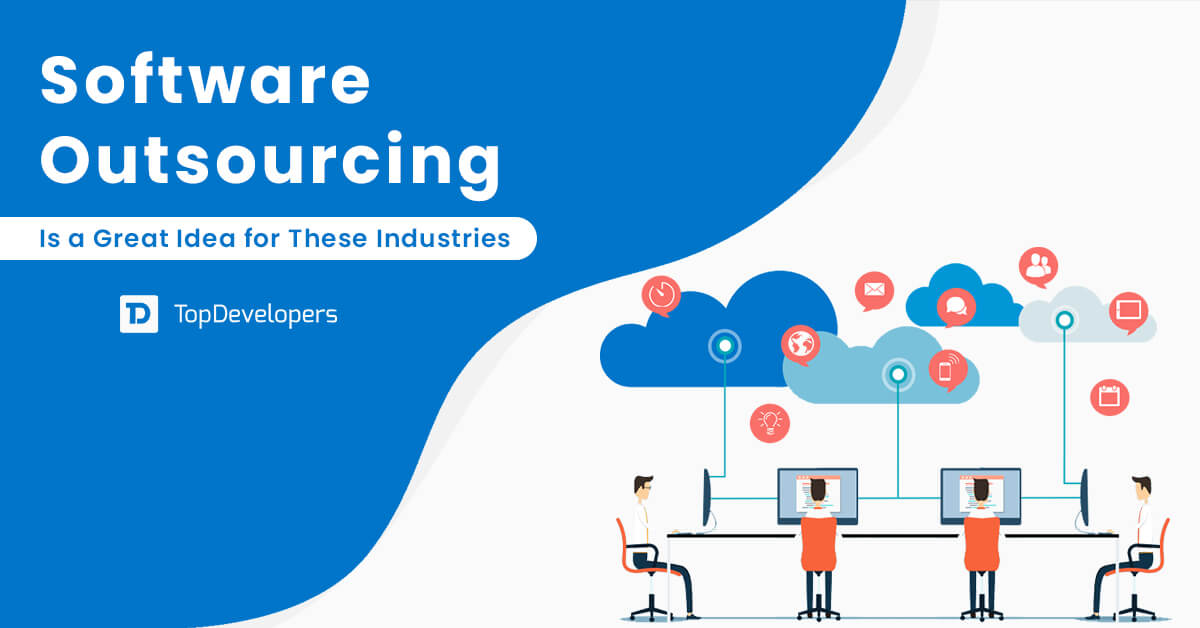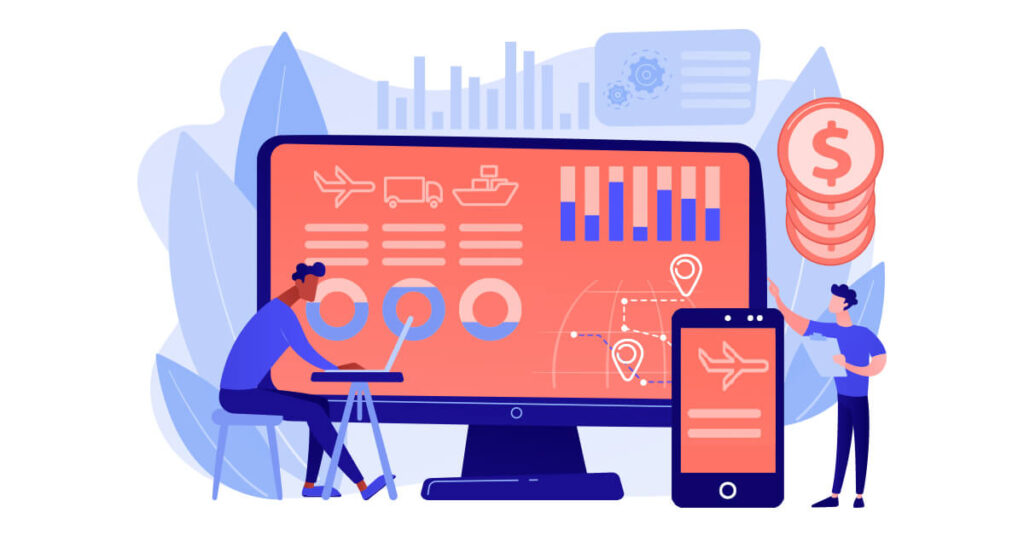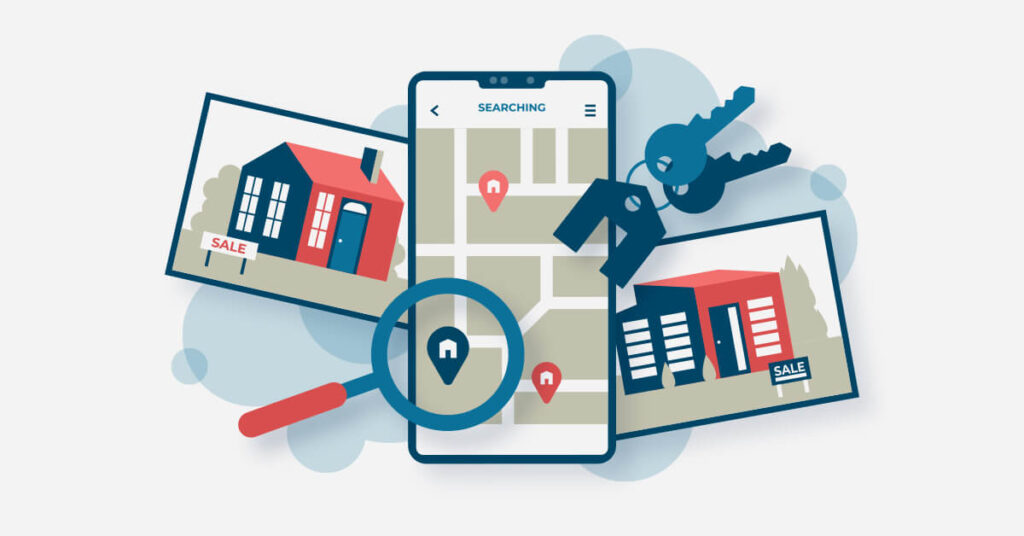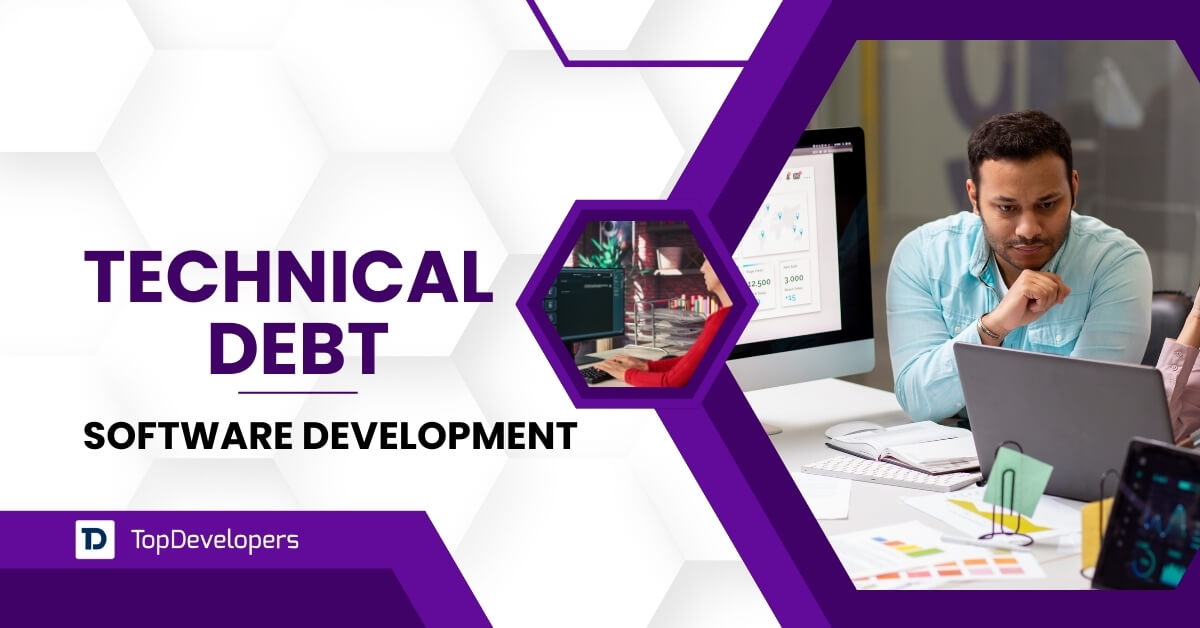
Did you know that software outsourcing is transforming the way businesses innovate and operate globally? Over the past decade, it has emerged as a cornerstone for enabling digital transformation, optimizing workflows, and driving efficiency. With the global software outsourcing market projected to reach $410.2 billion by 2027 and growing at a steady CAGR of 4.12%, the demand for outsourcing has never been stronger.
The immense value delivered by software outsourcing is evident in its adoption across industries from healthcare to retail to finance. This ever-expanding industry is fueled by its ability to offer cost-efficient solutions, scalability, and access to cutting-edge technologies. In this blog, we’ll explore the top industries leveraging software outsourcing to thrive in today’s competitive landscape.
Table of Contents
- Must-Know Statistics from the Software Outsourcing Industry
- Top Industries that are Benefiting from Software Outsourcing
- IT and Technology
- Tech Industry
- Cybersecurity
- Media and Entertainment
- Automotive
- eCommerce Industry
- Edtech Industry
- Government Projects Industry
- Oil And Gas Industry
- Agriculture Technology (AgTech)
- Transportation Industry
- Energy Industry
- Manufacturing Industry
- Telecommunications Industry
- Travel and Tourism Industry
- Automotive Industry
- Retail Industry
- Healthcare Industry
- Logistics Industry
- Finance Industry
- Real estate industry
- Ready to avail of software outsourcing?
Must-Know Statistics from the Software Outsourcing Industry
The software outsourcing industry continues to thrive, offering businesses of all sizes a lifeline to scale their operations, reduce costs, and stay competitive. Whether you are a startup, a small-to-medium enterprise, or a corporate giant, outsourcing provides unparalleled opportunities for growth and efficiency.
Here are some key statistics that highlight the immense potential of software outsourcing:
- Market Growth: According to Business Wire, the global software outsourcing market is projected to reach approximately $410.2 billion by 2027, reflecting its increasing adoption across industries.
- Global Market Expansion: The global outsourcing services market was valued at US$620.381 billion in 2020 and is expected to grow at a CAGR of 5.54% over the forecast period to reach a total market size of US$904.948 billion in 2027.
- Regional Growth: In North America, the software outsourcing market is anticipated to grow to $227.40 billion by 2027, reflecting the region’s robust demand for outsourced IT services.
- Adoption Rates: Approximately 66% of U.S. businesses outsource at least one department, underscoring the strategic role of outsourcing in modern business operations.
- Cost Efficiency: Companies report that outsourcing can reduce web development costs by an average of 60-70%, making it a cost-effective solution for accessing specialized skills.
- Technological Integration: The global AI and machine learning outsourcing market is expected to grow at a CAGR of 33%, driven by increased demand in sectors such as e-commerce, healthcare, and finance.
Top Industries that are Benefiting from Software Outsourcing
Creating long-term strategies for software development will allow businesses to grow boundlessly in association with software outsourcing companies. Here’s the list of 18 industries that have benefited from software outsourcing.
IT and Technology
The IT industry is the backbone of technological advancements and remains a leader in outsourcing adoption. Tech companies, ranging from startups to established giants, leverage outsourcing to access specialized skills, reduce costs, and accelerate project timelines.
Global leaders like Slack and WhatsApp have famously outsourced their software development during their early stages. Slack outsourced its app prototype to a Canadian design firm, resulting in the platform’s seamless interface. WhatsApp relied on Eastern European developers to manage its backend operations, enabling the core team to focus on user experience and scaling the platform.
Outsourcing in IT also facilitates innovation in areas like cloud computing, where external teams build scalable solutions for data storage and processing, and AI integration, enabling businesses to embed intelligent algorithms for smarter products. Moreover, IT firms use outsourcing to manage peak workloads, ensure faster time-to-market, and stay competitive in an ever-evolving digital landscape.
Tech Industry
Top industry leaders from Amazon to Facebook require software development excellence to roll out their projects as a part of a digital transformation initiative. To meet this digital need, tech giants source talent from IT outsourcing companies to meet the niche technology expert needs or shift their work overload with external assistance. This way, IT businesses such as Slack, WhatsApp, and others outsource their development tasks.
Certain challenges, such as data security concerns, cyber-attacks, and others, accompany digital success. Partnering with the right software development company providing outsourcing services and having skilled engineers will help resolve these issues. Other than the tech industry, E-commerce, manufacturing, and insurance are outsourcing their projects at scale.
Cybersecurity
In an era where data breaches and cyberattacks have become increasingly sophisticated, cybersecurity has emerged as a critical area for businesses across industries. Outsourcing cybersecurity services provides companies access to highly skilled professionals and cutting-edge tools without the need for in-house expertise.
Outsourcing partners specialize in:
- Threat Detection Systems: Leveraging AI and machine learning to identify potential vulnerabilities and malicious activities in real-time.
- Incident Response Platforms: Systems designed to mitigate the impact of cyberattacks through automated containment, analysis, and recovery protocols.
- Encryption Technologies: Ensuring secure data transmission and storage by implementing advanced encryption standards.
Examples include financial institutions outsourcing the development of fraud detection systems that analyze millions of transactions daily or healthcare providers integrating cybersecurity solutions to protect sensitive patient data under strict compliance regulations.
Furthermore, outsourcing helps businesses stay compliant with global standards like GDPR, HIPAA, and PCI DSS, ensuring that their operations are both secure and legally compliant.
Media and Entertainment
The media and entertainment industry has embraced outsourcing to keep up with the growing demand for digital content and personalized user experiences. Streaming platforms like Netflix utilize outsourced teams to develop AI-driven recommendation systems, ensuring viewers receive content tailored to their preferences.
Digital asset management systems, another key area of outsourcing, allow media companies to store, edit, and distribute their vast libraries of audio, video, and images efficiently. Additionally, outsourcing supports the integration of cutting-edge technologies like virtual reality (VR), which has become increasingly popular in gaming and interactive content.
Outsourcing helps media companies focus on creativity and innovation while external teams manage the technical complexities of software development.
Automotive
The automotive industry is undergoing a digital transformation, with connected and autonomous vehicles at the forefront. Outsourcing enables automotive companies to harness the expertise needed to develop autonomous driving software, advanced driver-assistance systems (ADAS), and in-vehicle infotainment platforms.
For instance, Tesla collaborates with external technology partners to integrate real-time data processing for its self-driving cars. Outsourced teams also specialize in developing cybersecurity solutions, ensuring vehicle networks remain secure from potential threats.
Additionally, outsourcing allows manufacturers to adopt agile development practices, enabling faster iteration and deployment of new technologies.
eCommerce Industry
eCommerce sales are growing at a CAGR of 9.4% and are estimated to be worth $6.3 trillion by 2024. The online shopping trend is expected to be driven by a growing number of people preferring E-commerce portals to buy things with secure and easier checkout. Scalable eCommerce app development is in demand so that E-commerce stores can easily accommodate the growing number of users, transactions, and others.
Personalized notifications, tailored recommendations right on the product description page, and customized app flow will help deliver a personalized experience with an e-commerce store. AI-powered chatbot integration is also getting popular to enable faster and more accurate responses to users.
Edtech Industry
The EdTech industry has experienced rapid growth, fueled by an increasing demand for accessible, flexible, and engaging learning solutions. Outsourcing plays a pivotal role in helping educational organizations and platforms meet these demands efficiently.
Educational organizations are embracing online learning platforms to enable elearning, facilitate virtual classrooms, ensure the best student management system, improve student engagement, and others. The support from the government, changing economic conditions, and betterment of education policies attributed to the worldwide educational software service market that will grow to $4980.51 billion by 2028 and generate $11.6 billion in revenue by 2025.
However, an interactive learning experience, in addition to seamless virtual classroom management while ensuring data security, is very important to stand out. Education institutes need to build personalized learning software, virtual classroom software, and others to seize an extra edge in the market. Outsourcing your software application development to an Education software development company that excels in engineering and delivering education software would be a good idea to succeed.
Global leaders like Khan Academy and Duolingo outsource software development to create applications that scale seamlessly while providing an interactive learning experience. These platforms rely on outsourced teams to integrate features like adaptive learning, gamification, and AI-driven personalization into their products.
Government Projects Industry
Every national government is investing heavily in digitizing government operations and processes. Every type of government project handles critical data that demands extensive cybersecurity. Along with the digitization process, the government needs to update jurisdictions and laws using advanced technology.
However, most of the government agreements with software companies are based on waterfall methodology, which is not at all good in the dynamic world. Government needs to be agile and change the developmental priorities according to changing users’ preferences. Government projects outsourcing to custom software development companies with experience of working in different development models will provide a lot of room for making changes at any level of the SDLC stage.
Oil And Gas Industry
The integration of technology in upstream, downstream, and midstream allows oil and gas companies to increase workforce productivity, ensure production efficiency, minimize cost, etc. Such digital transformation in the oil and gas market is expected to touch $68.64 billion by 2028. To harness the power of AI, ML, AR, VR, and IoT technology, making oil and gas businesses collaborate with technology service providers.
Despite large data volume handling and system integration issues, tech experts helping oil and gas businesses to be more sustainable and productive with insights-driven decision-making through seismic imaging, data analytics, drilling automation, etc.
Agriculture Technology (AgTech)
The agriculture industry is embracing digital transformation to address global challenges such as food security, climate change, and resource optimization. Outsourcing has been instrumental in the development of precision farming tools, which utilize cutting-edge technologies like IoT and AI to maximize productivity while minimizing environmental impact.
Outsourced innovations in AgTech include:
- IoT-Enabled Crop Monitoring Systems: Sensors installed in fields collect real-time data on soil moisture, temperature, and crop health, helping farmers make data-driven decisions.
- AI Algorithms for Predictive Analytics: These systems forecast weather patterns, pest infestations, and yield estimates, enabling proactive measures to improve outcomes.
- Automated Irrigation Systems: Outsourced software helps integrate weather data and soil conditions to optimize water usage, reducing waste.
For example, global agribusinesses have partnered with outsourcing firms to develop mobile apps that provide farmers with actionable insights, supply chain tracking, and market price updates. These tools are not only improving farm efficiency but also promoting sustainability across the agricultural ecosystem.
Transportation Industry
With rapid industrialization, the transportation market is witnessing enormous potential to grow. Transportation management systems accelerate this growth with the automation of supply chain operations such as planning, route optimization, shipment tracking, and others. It further helps minimize errors, time, cost, and others, which made an invaluable contribution to the growth of the TMS market size to $3.19 billion by 2029.
Also, the integration of advanced technologies such as AI, IoT, and blockchain helps improve the capabilities of transportation management systems (TMS). Self-driving trucks and 5G network rollout are creating new opportunities that require the assistance of technology experts. It makes transportation businesses outsource the solution development to a reliable partner.
Energy Industry
Efficient energy management is a need of the hour that industrial and commercial organizations increasingly recognize. Energy management software implementation helps with energy saving and reducing upfront expenditures with energy-consumption monitoring and demand-response solutions.
Favorable government policies and rising investment in sustainable energy, such as renewable energy, are driving the energy management market system that’s projected to reach $242 billion by 2030. Increasing smart meters and smart grid installation is a part of this process, which is quite complex to handle for energy industry experts. Outsourcing an energy management platform or smart grid system development to remote developers at offshore IT company is a good move.
Manufacturing Industry
Manufacturers are embracing digital transformation to be competitive, reap benefits with industrial automation, and tackle manufacturing challenges optimally. With the Industry 4.0 revolution, smart manufacturing is expected to reach $548 billion by 2024, with device management, asset management, performance optimization, condition monitoring, best communication, and other functionalities on the table.
The data-driven insights from raw material sourcing to production lines with IoT sensors integration improve supply chain management and enable predictive maintenance. It requires specialists’ assistance, which makes manufacturers outsource industrial automation software projects.
Telecommunications Industry
The telecommunication industry is taking a giant leap with the latest trends, including the rollout of 5G+, cloud computing, generative AI, no-code configurations, and open APIs. Driven by technological innovation, telecom businesses are streamlining customer services with quick and efficient responses. No-code technology enables faster adoption of digital services, and open APIs help meet digital needs with cost-effective integrations.
The improved flexibility, security, and efficiency forecast strong growth in the telecom market size, which is expected to reach $3106.93 billion by 2024. Realizing the growth of the telecom market, Lumen Technologies expanded its services with the launch of the NaaS platform to set new standards for customer experiences.
Travel and Tourism Industry
The world is presumed to be at pre-pandemic levels, and travelers started visiting different places. However, the pandemic left its indelible mark in the travel and tourism industry with online travel planning, hotel booking, tour management, etc. Users increasingly expect seamless reservations and personalized experiences followed by instant notifications for everything.
Strategic collaboration with technology partners such as travel portal developers and advanced technology leverage allows travel businesses to keep up with evolving market trends. Virtual tour guides give a 360-degree of the pace before visiting it, itinerary planning ensures users forget nothing on their next trip, and the travel booking platform facilitates hassle-free reservations. The popularity of travel and hospitality software is clearly viewed from its growth, which is expected to reach $5.52 billion by 2032 at a CAGR of 4.8%.
Automotive Industry
In the wake of the mobile revolution, the global automotive software market size is expected to reach $77.0 Billion by 2032, exhibiting a growth rate (CAGR) of 15.7% during 2024-2032. The trend is driven by rapid advancements in autonomous vehicles, increasing demand for electric vehicles (EVs), growing popularity of connected car technology, stringent safety regulations implementation, and advanced technology leverage.
The shift towards integration of infotainment, rising adoption of SaaS models, and compliance with diverse regulatory standards won’t allow automotive companies to focus on R&D and strengthen their market position. Hiring an automotive software service provider enables one to keep up with evolving technology trends and maximize vehicle efficiency while living up to the users’ expectations.
Retail Industry
Retail is one of the biggest industries in the world, with the owners of retailers like Walmart, Target, and Amazon regularly featuring among the richest people in the world. Retail plays a big role in our daily lives as we have to visit a retail store almost on a daily basis. There are millions of retail transactions that happen all over the world every day.
The retail industry was one of the worst-hit industries during the pandemic. Adding to that, today’s customers want everything fast and at deep discounts. That’s when most of the retailers realized the value of automating their systems, and many of them opened new online modes of selling.
Retail software solutions can help retailers improve their efficiency, gain leverage through JIT(just-in-time) inventory, reduce manpower and reduce pilferage of goods. Thus, retail software helps retailers save money and help them to offer deep discounts to their customers.
American retailers Wayfair and Chewy are two shining examples of how developing software for retail businesses can help retailers improve their profits. Wayfair reported robust growth numbers post-pandemic after implementing certain eCommerce software. The customer count of Chewy surged to 17.8 million when the retailer started using customer acquisition software. Hiring top-most from the best retail software development service providers to build retail software for your business can be cost-effective and beneficial to retailers.
Technologies like AR (Augmented Reality) help retailers engage their customers. For Example, Ikea is a brand that uses AR technology to show its customers how a piece of furniture will look in their room. Though the development of AR-enabled retail software could be costly, the experience it provides to the customers in their buying process just makes it a must-have feature for any retail business.
Healthcare Industry
The healthcare sector faces unique challenges, including stringent regulations, sensitive patient data, and the need for robust and scalable solutions.
Healthcare providers are increasingly outsourcing the development of Electronic Health Records (EHR) systems to streamline patient data management and improve efficiency. Similarly, telemedicine platforms, a necessity during the pandemic, are often outsourced to ensure quick deployment while maintaining compliance with laws like HIPAA.
For instance, outsourcing enables the integration of AI-driven analytics into healthcare systems to predict patient outcomes, while IoT-powered devices facilitate remote patient monitoring. This approach not only reduces operational costs but also enhances patient care by introducing cutting-edge solutions. With patient data security being a critical concern, outsourcing partners bring expertise in cybersecurity, ensuring sensitive information remains protected.
Outsourcing healthcare software development to top companies has transformed healthcare by creating various applications for different fields in the industry.
- EHR(Electronic Health Record) software to maintain accurate healthcare records
- Telemedicine for contactless and remote diagnosis
- Cloud medical solutions
- AI analytics for patient history
- Patient data management
When a product or software is launched, it needs to be ensured that different rules and regulations that must to be followed in different parts of the world are abided by. These regulations vary from country to country and state to state across various industries. The healthcare industry is one of the most critical among these as there are many compliance that need to be taken care of. Thus selecting one from the best healthcare software development companies can make it easy for you as a business as the company is experienced and has the expertise to develop a health solution by abiding by all the applicable rules and regulations.
“What are your areas of technical expertise?” Among most important questions to ask the software development company before hiring.
Logistics Industry
The logistics industry is evolving with time and is one of the first adopters of technology. Software plays an important role in a logistics company. Using the best supply chain management software, the logistics company can keep track of the parcels, book new orders, manage the movement of the parcels, handle the customs of different countries, and communicate with the fleet drivers as and when necessary.
Logistics software can help a logistics business improve the customer experience by providing accurate parcel tracking details 24×7. Logistics software can also help the logistics business reduce logistics costs and remove the visibility issues of the supply chain.
Using custom logistics software solutions, logistics business owners can adhere to the frequently changing government regulations. Building logistics software is a complex task to track the shipments and do advanced analytics. You might require technologies such as IoT to be integrated with your logistics software while developing it. This is where the top logistics software development company will have a very vital role to play in helping you to mobilize your logistic business efficiently.
You need to look at software development for your logistics company as one of the most efficient ways to transform your logistics business in this digital era. And, outsourcing your logistics software development need to remote logistics software developers can help take your business places.
Finance Industry
The finance industry is one of the most software-dependent sectors, relying on robust and secure solutions for its day-to-day operations. From core banking systems to digital wallets, software enables users to transfer money, check balances, book fixed deposits, purchase insurance, and more. In today’s digital-first world, no financial institution can imagine functioning effectively without the support of fintech software.
Outsourcing plays a crucial role in enabling financial institutions to build innovative and secure solutions while managing costs and compliance. Fintech software development firms specialize in delivering customized software solutions that align with the specific needs of financial businesses, ensuring efficiency and scalability.
Key areas where outsourcing adds value include:
- Fraud Detection Systems: Outsourced partners develop machine learning algorithms to analyze transaction patterns, flag suspicious activities, and prevent fraud in real time.
- Blockchain Solutions: Many fintech startups outsource Blockchain development to create platforms that support cryptocurrencies, smart contracts, and transparent transactions.
- Secure Credit Analysis Software: Loan disbursing companies rely on outsourced solutions to evaluate prospective customers’ credit records and make informed decisions.
Additionally, global payment giants like PayPal and Stripe outsource parts of their technology stack to streamline operations, improve scalability, and remain competitive in a fast-evolving market.
The finance industry also faces the dual challenges of stringent regulatory norms and increasing cyber threats. Outsourcing helps financial institutions comply with global standards like PCI DSS while safeguarding sensitive data against hackers. Building secure financial software is no small feat, but partnering with the right fintech software development firms ensures businesses can meet these challenges head-on and deliver superior, compliant solutions.
Real estate industry
Real estate is a sector where you can leverage the power of software for the benefit of your business. Comprehensive software can help a real estate and construction business owner manage all their activities like listing properties and sorting these properties according to their cities and other filters. A quality real estate solution puts the information in front of the decision-makers in an easy-to-digest form. This way, the high-quality real estate software helps in minimizing the workload of the real estate companies.
Using the finest real estate software, you as a realtor can generate genuine leads for your project. The reliable real estate software application helps you to manage all your clients and keep the relationship with these clients active for future deals.
Through real estate software solutions, realtors can keep their clients updated regarding their latest projects and properties on sale. Software developed for the Real estate industry simplifies the sales funnel and helps realtors manage their work easily. You can outrun the competition by implementing innovative real estate solutions like chatbots. These chatbots can help your customers resolve their issues quickly and efficiently.
Outsourcing your real estate software development to the right real estate software development developers will help to increase your ROI.
Ready to avail of software outsourcing?
The digital revolution has reshaped market boundaries and transformed the way customers are engaged. Software development is a way to automate operations, improve workflow, increase productivity, and drive innovation. Redefining the trade, digital transformation reduces the distance between businesses and software development companies in another corner of the world.
The availability of endless tools for connecting and collaborating with offshore software developers allows businesses of diverse industry verticals to benefit from software development outsourcing and focus on their core business operations. The required experience and expertise of the outsourcing team in delivering state-of-the-art software solutions pave the path to a more profitable approach for businesses.
The software has become an integral part of the day-to-day operations of many industries. Although one can hire a team of in-house software developers, outsourcing software development to experts often proves to be the correct decision. This is because these leading software development companies have the required experience and expertise in delivering state-of-the-art software solutions for their clients from different industry verticals. Moreover, software development outsourcing to developing nations like India proves to be cost-effective, thus paving the path to a more profitable approach for businesses.
Take the driver’s seat and move forward in the digital era in association with software development outsourcing companies to cut through the noise.
 Avantika Shergil
| Dec 11, 2024
Avantika Shergil
| Dec 11, 2024
Avantika Shergil is a technology enthusiast and thought leader with deep expertise in software development and web technologies. With over 8 years of experience analyzing and evaluating cutting-edge digital solutions, Avantika has a knack for demystifying complex tech trends. Her insights into modern programming frameworks, system architecture, and web innovation have empowered businesses to make informed decisions in the ever-evolving tech landscape. Avantika is passionate about bridging the gap between technology and business strategy, helping businesses build customized software and website, and understand about different tools to leverage effectively for their ventures. Explore her work for a unique perspective on the future of digital innovation.











